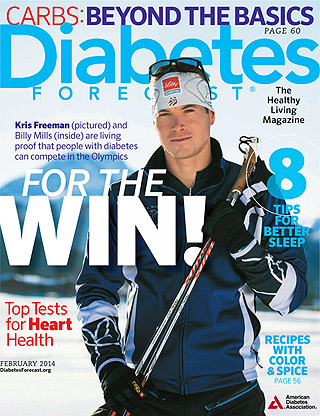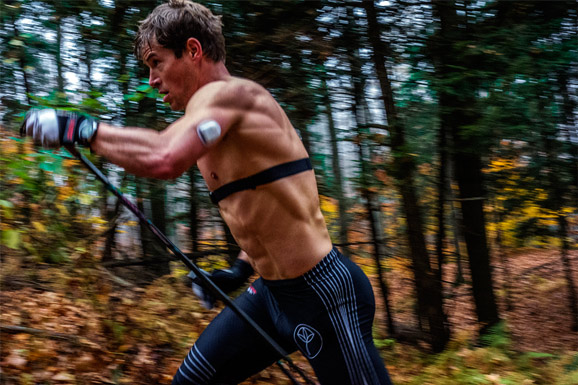Type 1 Diabetic Kris Freeman – Olympic Cross-Country Skier

Type 1 Olympic cross-country skier Kris Freeman graces the February 2014 cover of Diabetes Forecast.
At age 19, the very same year that Kris Freeman was asked to join the U.S. Ski Team, he received the news that he could have let alter his future as a skier. He was diagnosed with Type 1 diabetes. The year was 2000 and by then Freeman had already been on a lifelong trajectory to become an Olympic skier. His parents, who were both cross-country skiers themselves, pulled Kris behind them in a sled before he could even talk. He competed in his first race by age 5 and by 19, he had competed at the junior world championships three times.
After his Type 1 diagnosis, Freeman says that although his dream of being an Olympic skier didn’t change, he was “very confused about what it all meant.” He was becoming an adult and would be leaving home for the first time to train full-time with the U.S. Ski Team in Park City, Utah. Being diagnosed with Type 1 diabetes was not the way Kris Freeman wanted to start his career as a professional cross-country skier. He now began to question his body’s abilities. Could he still compete at an Olympic level in an event that requires maximum endurance? Could he push his body to its limits while still effectively managing his blood glucose?
“The way to not be terrified was to learn as much as I could about [diabetes],” says Freeman. He began to study his body like a scientist, especially the way food, insulin and exercise affected his blood glucose. Over and over and over, he took to the treadmill to understand how anaerobic exercise affected his blood sugar. He compared that to the effects of the less intense aerobic exercise. The first would initially cause his blood sugar to soar, while the latter would have somewhat the opposite effect. Kris’s discipline and self-education paid off. He has won 15 national championships and placed fourth in the world championships twice. Oh, and he’s also making his fourth trip to the Winter Olympics this year in Sochi.
Type 1 Olympic Skier Kris Freeman uses both an insulin pump and a continuous glucose monitor (CGM), and says that he tests his blood glucose three to four times a day on average. Do to his training routines, he adjusts his insulin dosage on almost a daily basis. Does Freeman now have perfect control of his diabetes at all times? No, that wouldn’t be reality. However, he says that he has only been severely hypoglycemic during a race twice. Unfortunately, the last time was in 2010 at the Vancouver Winter Olympics. It significantly affected his overall time in a competition, and in another event his coaches pulled him out, seeing how taxed his body had become.

Kris Freeman’s diabetes doesn’t keep him from striving for Olympic gold. Here, he trains with an OmniPod insulin pump attached to his arm.
Since then, Freeman has further adjusted his insulin levels during competition and is now at the top of his game. He has also learned to take into account how the mere stress and adrenaline from being on a world stage can affect his blood glucose levels. “I feel as confident as I ever have in my diabetes management,” says Freeman, who is ready to compete in the Winter Olympics in Sochi.
Type 1 diabetic Olympian Kris Freeman is an inspiration. Hearing his story reminded me of what a good friend once told me immediately following my own diagnosis in 2004. He said that to be on top of your diabetes, you have to learn as much as you can about it. You need to become an expert, acquiring more knowledge than even your own doctors possess. After all, most aren’t Type 1s themselves. Like Kris Freeman, you have to approach the disease like a scientist conducting research.
While I have yet to fully embrace that advice to the extent I know I should, it’s what I believe will give me the chance to live a long and healthy life. Stories like Kris Freeman’s are sometimes the motivation we need to step up our own game.





 My name is Kevin Lang and I am a Type 1 Diabetic who was diagnosed in May of 2004 at the age of 27. My last A1C was 6.0 in May 2015. I used to use daily shots of Lantus and Novolog to control my blood sugar until I switched to the MiniMed Paradigm Revel Insulin Pump in February 2011. To learn more about me, follow the about link in the menu bar.
My name is Kevin Lang and I am a Type 1 Diabetic who was diagnosed in May of 2004 at the age of 27. My last A1C was 6.0 in May 2015. I used to use daily shots of Lantus and Novolog to control my blood sugar until I switched to the MiniMed Paradigm Revel Insulin Pump in February 2011. To learn more about me, follow the about link in the menu bar.